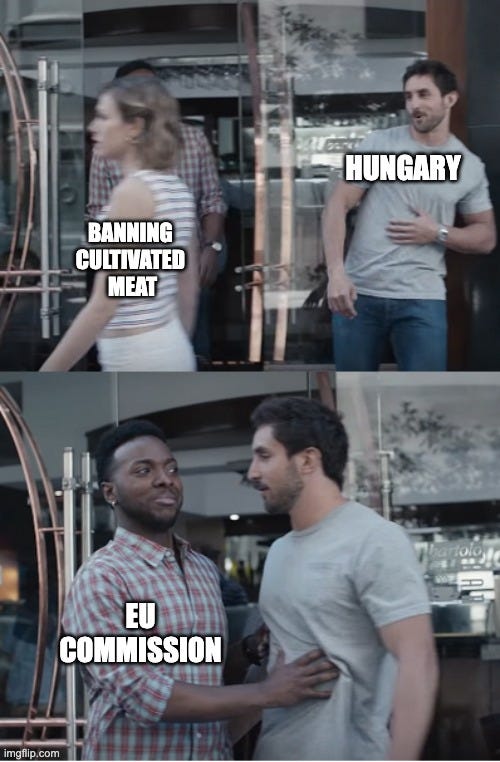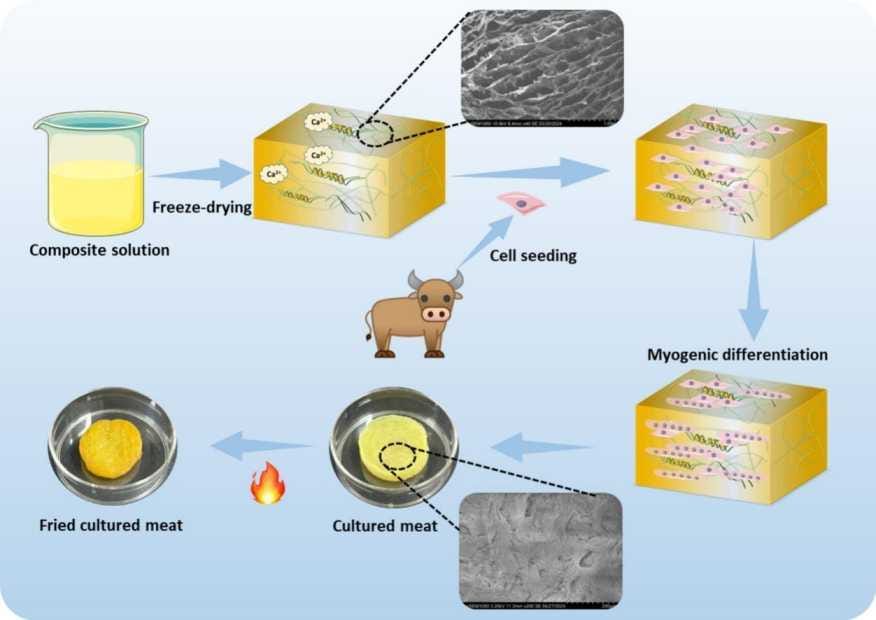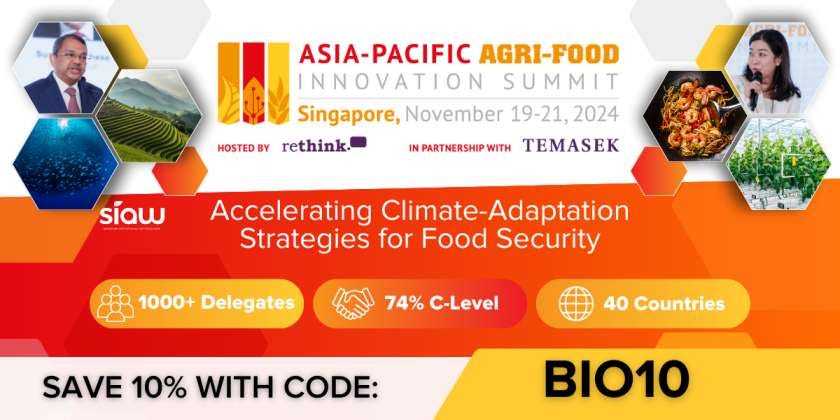Singapore Cultivated Chicken Tasting, €10M Finnish Alt Protein R&D, and Major Bio-Based Crop Protection Partnerships
Also: The EU Commission rejects the evidence provided by Hungary to justify banning cultivated meat
Hey, welcome to issue #80 of the Better Bioeconomy newsletter. Thanks for being here!
If you’re an agrifood tech founder, investor, or someone working on tech-based solutions for sustainable food systems, I’d love to connect. I started this newsletter to meet folks with similar interests, so feel free to reach out to chat on LinkedIn or hop on a call—I’m always happy to discuss ideas and opportunities! 🙂
Now, let’s dig into the latest developments in biotech-enabled agrifood businesses and breakthroughs! 🍽
BIO BUZZ
🇸🇬 Vital Meat held a public tasting event in Singapore, where it expects regulatory approval “very soon”
The event took place at Hue, a Thai restaurant owned by Chef Neo Jun Hao, who created three dishes using Vital Meat’s cultivated chicken. The menu focused on traditional Singaporean flavours, showcasing how cultivated meat can fit into local cuisine.
The French startup’s cultivated chicken ingredient is in paste form, which can be processed into various formats, such as powder or batter. This versatility allows chefs to create various dishes
Vital Meat is discussing future partnerships with multiple restaurants and food players, and Hue is expected to be one of its launch partners.
Source: Green Queen
🐾 Friends & Family Pet Food Company partners with Novel Farms to develop cultivated meat for pets, targeting a 2025 launch
The collaboration focuses on creating cultivated meats such as quail, chicken, pork, and mouse. It is still in the testing and prototyping phases. The partners have begun engaging with regulatory authorities, specifically the FDA's Center for Veterinary Medicine.
Friends & Family has developed a proprietary platform that integrates freeze-drying technology for cultivated meat, aiming to scale these products commercially. Their goal is to create a recognizable pet food brand using cultivated ingredients developed with the help of bioscience companies.
CEO Joshua Errett envisions a "house-of-brands" strategy, with each product line having its own identity while contributing to a larger, iconic pet food brand. The company intends to tailor their offerings to specific pet food categories.
Source: Green Queen
🍣 AQUA Cultured Foods' fermentation-based raw seafood alternatives are now available in foodservice
Mama Delia, a Michelin Bib Gourmand restaurant in Chicago, introduced AQUA’s cultured tuna in a new "Atún Crudo" dish by Chef Marcos Campos Sanchez. The dish features tuna, potato strings, and fried eggs, and a vegan option is available.
The tuna and scallop alternatives are made from water, cellulose fibre, and plant-based ingredients through fermentation, using beet-derived colour for tuna. They are vegan, allergen-free, pregnancy-safe, and free from microplastics, mercury, cholesterol, and saturated fats.
Chef Campos praised AQUA’s Tuna for its authentic taste and appearance, noting that it resembles traditional tuna so closely that diners may not notice a difference.
Source: vegconomist
🥛 All G plans to launch high-value precision-fermented dairy proteins starting with bovine lactoferrin, followed by human lactoferrin
The Australian company focuses on maintaining positive margins from the outset. The company’s founder, Jan Pacas, wants to start with a profitable niche before scaling into broader markets.
All G targets four primary markets for bovine lactoferrin: adult nutrition, nutraceuticals, cosmetics/personal care, and infant formula (although regulatory hurdles delay its entry into infant products).
The company plans to introduce recombinant casein proteins after launching lactoferrin. Its proprietary technology enables the production of stable and customizable casein micelles for specific food applications (e.g., cheese with tailored texture).
Source: AgFunder
🇪🇺 The EU Commission rejects the evidence provided by Hungary to justify banning cultivated meat, calling it unnecessary and premature
Hungary’s proposed ban aimed to “protect” traditional European food practices, with support from countries like Italy, Austria, and France, which previously pushed similar measures within the EU Agrifish Council.
The EU stated that the European Food Safety Authority (EFSA) is responsible for thoroughly vetting all novel foods before they can be sold across the EU, ensuring consumer safety.
The Commission noted that cultivated meat is not yet available in Europe, deeming national bans unnecessary and potentially disruptive to the EU's standardized authorization process.
Source: Green Queen
🤝 Vestaron announced a long-term strategic agreement with ADM to produce its peptide-based crop protection solutions
The agreement allows Vestaron to ramp up its production capacity to meet rising global demand for environmentally friendly crop protection products, ensuring a steady supply chain.
ADM’s vast manufacturing facilities, strategic locations, and access to raw materials provide Vestaron with stability, scalability, and cost efficiency, improving overall production capabilities.
With ADM's support, Vestaron will be able to serve existing markets more efficiently while expanding its reach into new ones, strengthening its global presence.
Source: GlobeNewswire
🌱 90% of farmers plan to maintain or increase spending on bio-based crop protection
According to McKinsey’s Global Farmer Insights 2024, farmers increasingly turn to agtech and biological inputs to enhance productivity and manage challenges like extreme weather events.
Brazil leads globally in the use of biologicals, with 64% of farmers using bionutrients and 61% using biocontrols, largely due to strong government support and high fertilizer costs.
Despite fluctuations in input prices, 90% of farmers plan to maintain or increase spending on bio-based products, showing a preference for integrating biologicals with existing chemical protocols for improved yield.
Source: AgFunder
⚡️ More buzzes
🤝 AgroSpheres and BASF formed a strategic partnership to develop a novel bioinsecticide to improve sustainable crop protection. The bioinsecticide, which uses AgroSpheres' AgriCell-powered biomolecules, is highly effective against lepidopteran pests, even at low doses. (iGrowNews)
🦠 BioArmix’s novel crop protection solution targets bacterial pathogens using predatory, non-GMO bacteria. The Israeli startup’s predatory bacteria target gram-negative pathogens that affect crops while sparing beneficial bacteria. (AgFunder)
BIO BUCKS
🍯 MeliBio secured pre-Series A funding to accelerate its vegan honey while advancing its precision-fermented honey line
The strategic investment from Future Food Fund by Oisix will help the San Francisco-based startup scale its Mellody product distribution and drive further innovation in vegan honey production.
Mellody differentiates itself from other vegan honey by using a blend of glucose, fructose, plant extracts like red clover and jasmine, and gluconic acid to authentically mimic honey flavour.
MeliBio’s process recently saw a 1,300% increase in enzyme production efficiency on the precision fermentation front. This was supported through scale-up efforts with Pow.Bio, an AI-led biomanufacturing partner, as MeliBio continues to optimize its biotech capabilities.
Source: Green Queen
🇫🇮 Business Finland allocated €10M to two Finnish R&D projects, FoodID and FinBioFAB, to develop alt proteins and materials
The projects joined the NSF-led Global Centers program, a six-country initiative focusing on biofoundries and biodiversity to tackle global challenges in the bioeconomy.
Coordinated by the University of Nebraska-Lincoln, the FoodID project aims to innovate in alternative proteins and lipids using digital tools, fermentation, and plant-based processes for sustainable and healthy food ingredients.
Finnish organizations like Enifer, Onego Bio, Fazer, MeEat, and Valio are collaborating to enhance food systems by developing sustainable protein sources and alternative ingredients and using circular economy practices.
Source: vegconomist
💰 More bucks
🤖 New Wave Biotech won the €20,000 EIT Food Accelerator Network Tech Validation Award. The funding will help with technology testing and validation for its AI and computational modelling system, which helps companies develop alternative proteins. (Zoe Yu Tung Law)
GEEK ZONE
🥩 Quercetin-enriched animal-free scaffolds promote cell proliferation and differentiation in cultivated beef production
The scaffold's design aimed to address limitations in current materials used for cultured meat, like plant proteins and gelatin, by improving mechanical properties and providing better cell growth environments.
The chitin-sodium alginate-quercetin (CH-SA-QR) scaffolds exhibited a porous structure, promoting cell proliferation and differentiation, particularly with the QR1 and QR1.5 variations.
When fried, the cultivated meat produced using these scaffolds was as tender, if not more so, than traditional beef. However, its appearance was different, resembling fried meat cutlets.
Source: ScienceDirect
🧬 Engineered dsRNA–protein nanoparticles show effective systemic gene silencing in plants
Researchers created cationized bovine serum albumin (cBSA) bound with double-stranded RNA (dsRNA) to form nanocomplexes for efficient, systemic gene silencing in plants.
These nanocomplexes effectively silenced both inducible and constitutive genes in Nicotiana tabacum (tobacco) and Populus (poplar), achieving gene silencing in tissues distant from the application site.
Unlike previous RNA delivery methods requiring external force, cBSA/dsRNA can be applied simply through plant petioles or shoots, allowing non-invasive, wide-spread delivery without tissue culture.
Source: Oxford University Press
🔬 Biofabricating cultivated fat using dynamically cultured, differentiated bovine adipose-derived stem cell spheroids
The study developed a method to produce bovine fat using adipose-derived stem cells (bASCs) cultured into spheroids, which improves the flavour and texture of cultivated meat. The spheroids were successfully cultured and differentiated into fat tissue in static and dynamic 3D environments.
The researchers optimized a simple, antibiotic-free, one-step differentiation protocol using supplements like rosiglitazone, insulin, and dexamethasone. This method produced stable and viable fat spheroids in a short period.
The process used no fetal bovine serum (FBS). Stable and bioprintable differentiated spheroids offer the potential for use in larger cultivated meat products when combined with edible materials like gellan gum.
Source: Nature
🍊 Application of Streptomyces bacteria reduced mold infection in postharvest navel oranges by more than 50%
The study explored the biocontrol potential of Streptomyces sp. N2 as an alternative to chemical fungicides in managing citrus postharvest decay, addressing resistance issues in Penicillium digitatum and Penicillium italicum.
Streptomyces sp.N2 bacteria boost the orange's defences, reducing ROS levels and increasing the production of protective enzymes and pathogenesis-related proteins.
The bacterium produces bioactive substances that inhibit mold growth, damage fungal structures, and impair their metabolic functions. In vivo tests on navel oranges showed a 53.8% decrease in disease incidence.
Source: ScienceDirect
🐤 Pre-plated chicken embryo fibroblasts for cultivated meat production can be cultured up to 15 passages
The study found that Chicken embryo fibroblasts (CEFs) isolated via pre-plating can be cultured up to 15 passages. However, proliferation declines after passage 11, limiting their effective use for consistent cultivated meat production.
Early-passage CEFs effectively trans-differentiate into adipocytes with large lipid droplets using oleic acid and rosiglitazone. However, differentiation efficiency significantly drops by passage 9.
Oleic acid triggers lipid accumulation, while rosiglitazone promotes full adipogenic differentiation. This combination induces the desired adipocyte morphology primarily in low-passage CEFs.
Source: MDPI
POST & POD
💚 Humanity’s survival depends on a sustainable planet with access to safe food, clean water, and healthy ecosystems—not AI
Food production contributes to one-third of greenhouse gas emissions and is a major factor in deforestation and biodiversity loss.
Increased frequency and severity of natural disasters—such as wildfires, hurricanes, and heatwaves—highlight the need for immediate and effective climate action, particularly within food systems.
Progress in food technology requires technical advancements and unity among stakeholders. Building sustainable models and supporting others is key to creating resilient food solutions that address planetary health.
Source: Magi Richani
🎧 Parendi Birdie on her journey building alt protein startups and using plants to enhance meat at Asentia
APAC AGRI-FOOD INNOVATION SUMMIT
🤝 Meet 1000+ global leaders who are accelerating climate-adaptation strategies for food security in Asia
Better Bioeconomy is excited to be a media partner for the Asia-Pacific Agri-Food Innovation Summit at Marina Bay Sands on November 19-21!
As the anchor event of Singapore International Agri-Food Week (SIAW), in collaboration with Temasek, the Singapore Food Agency (SFA), and Enterprise Singapore (ESG), the Asia-Pacific Agri-Food Innovation Summit will bring together over 1000 global leaders to identify the strategic priorities as we build greater capacity, security, and resilience in Asia’s agri-food system.
👀 Use my discount code ‘BIO10’ to save 10%
Register here. See you there! 👋🏾
BETTER BIOECONOMY EXCLUSIVE
💬 My recent conversations with bioeconomy innovators
Founder of Media City Scientific, Katie Bashant Day: A Scientist-Founder’s Journey to Make Biotech Research Reliable and Ethical
Innovation Specialist at The Good Food Institute India, Devika Suresh: Laying the Foundation for Smart Protein Leadership in India
Biotech consultant and ex-CSO of Vow, James Ryall: Bridging Science and Business to Support Startups Using Biomanufacturing
Check out more conversations!
That’s a wrap. Thank you for taking the time to read this issue!
Are you new here?
Know anyone else who would dig this newsletter?







Thanks Eshan for this wonderful issue #80. It has a nice mix of both cute and informative graphics, and lots of exciting alt protein news. I like what Friends and Family are doing with creating pet food. That's a huge market. Im looking forward to when the quality and price rivals traditional pet foods. I'll only buy alt protein products even if they are twice the price. I think AI will make significant breakthroughs in the alt protein space as it evolves at exponential speed. It's awesome to see lots of venture capital coming into the space. That's smart money 💰. I'm sending you positive thoughts and good vibrations for all the work you're putting into your noble work. Have a very nice and peaceful week. The community appreciates you my friend 👍
I've been glued to these newsletters! Thanks for another great one.